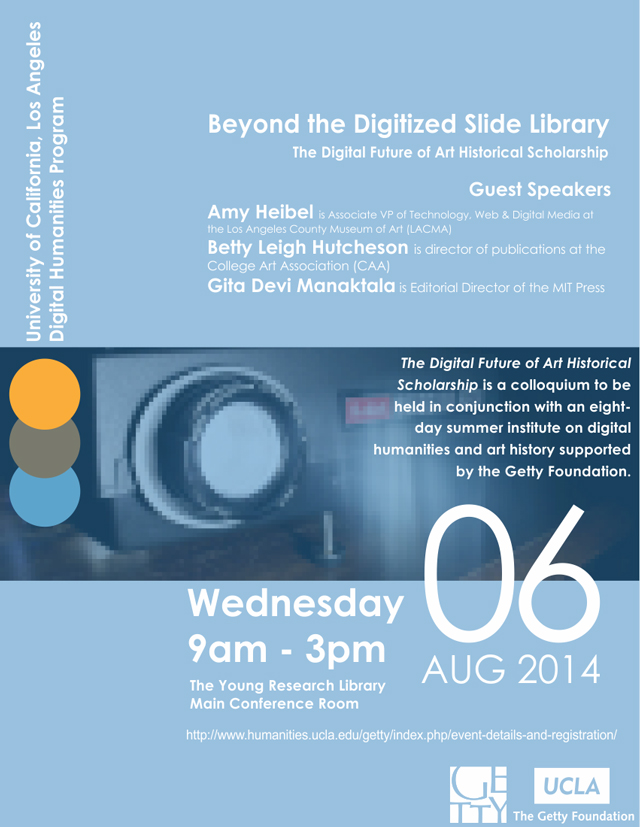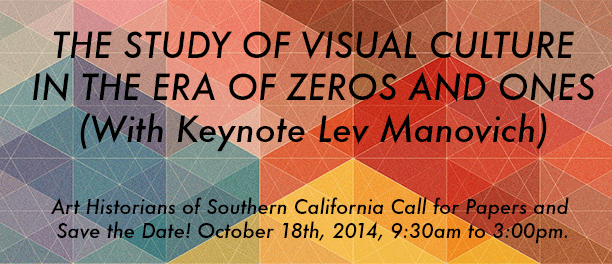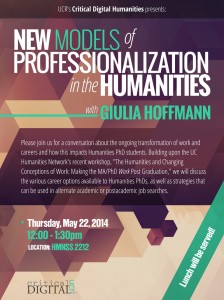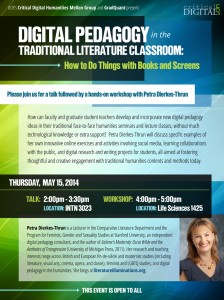http://www.humanities.ucla.edu/getty/index.php/event-details-and-registration/
The Digital Future of Art Historical Scholarship
The Digital Future of Art Historical Scholarship is a colloquium open to the public, which will be held in conjunction with the eight day summer institute “Beyond the Digitized Slide Library.” The event will be held on Wednesday, August 6, 2014 at UCLA in the Young Research Library Main Conference Room.
Colloquium Schedule
10–10:30: Introduction
10:30–12: Panelists Talks
12–1: Lunch
1–2: Participant Responses
2–3: Open discussion
3–5: Reception
Guest speakers:
- Amy Heibel, Associate VP of Technology, Web & Digital Media at the Los Angeles County Museum of Art
- Betty Leigh Hutcheson, Director of Publications at the College Art Association
- Gita Manaktala, Editorial Director of the MIT Press
http://www.h-net.org/announce/show.cgi?ID=213785
RECONSTRUCTION:
Studies in Contemporary Culture,
[http://reconstruction.eserver.org/]
Volume 16.1 (2016)
ARCHIVES ON FIRE:
Artifacts & Works, Communities & Fields
Archives today are on fire–energized and endangered, mobile and mutable, ubiquitous and unique–as the library’s form and function in society undergo significant changes. Digital tools, open-access platforms, and social networks are transforming the fields of artistic creation, research, and knowledge production, sparking new interest in hand-made artifacts and ephemera, visual and audio cultures, manuscripts and printed texts, micro-histories and intentional communities. Dynamic channels for communication and production become possible within and across the disciplines. Hybrid forms of discourse challenge aesthetic, generic, and methodological standards, reconfiguring frameworks for authorship and audience, content and copyright, personae and politics within and beyond academia. Archives are vital forces of and for change.
This volume of RECONSTRUCTION, guest-edited by W. Scott Howard (University of Denver), invites proposals for articles, essays, and hybrid works addressing a range of creative and critical engagements, including, for example: archives, curation & museum studies; book arts, typography & design; collection development & access; crowdsourcing & DIY research; documentary poetics; emergent digital practices; game studies; image & text studies; information ethics & hacktivism; interdisciplinary & multimodal studies; literary & cultural studies; small press & open-access publishing; trans-discursive critical theory.
Proposals (November 30, 2014 deadline): send 300-word abstract and 2-page CV to showard[at]du.edu
Reconstruction: Studies in Contemporary Culture (ISSN: 1547-4348) is an innovative online cultural studies journal dedicated to fostering an intellectual community composed of scholars and their audience, granting them all the ability to share thoughts and opinions on the most important and influential work in contemporary interdisciplinary studies. Reconstruction publishes three Themed Issues and one Open Issue per year.
Send Open Issue submissions (year round) to: reconstruction.submissions_at_gmail.com and submissions for Themed Issues to the appropriate editors listed on the site at www.reconstruction.eserver.org
Reconstruction also accepts proposal for special issue editors and topics. Reconstruction is indexed in the MLA International Bibliography.
 Scalar @ ANVC (Alliance for Networking and Visual Culture at USC):
Scalar @ ANVC (Alliance for Networking and Visual Culture at USC):
http://scalar.usc.edu/learning_scalar/webinar-schedule/
Join us for upcoming webinars.
To follow up on our recent Beta release, the Scalar development team will be offering a series of free online webinars this spring and summer.
Our “Introduction to Scalar” webinars will cover basic features of the platform: a review of existing Scalar books and a hands-on introduction to paths, tags, annotations and importing media. Our “Intermediate Scalar” webinars will delve into more advanced topics including the effective use of visualizations, annotating with media and a primer on customizing appearances in Scalar.
Our summer schedule includes the remaining dates:
Intermediate Scalar: July 31, 4-6pm (PST)
Our fall schedule includes six dates:
Introduction to Scalar: August 21, 10am-12pm (PST)
Intermediate Scalar: September 11, 10am-12pm (PST)
Introduction to Scalar: September 25, 4pm-6pm (PST)
Intermediate Scalar: October 9, 4pm-6pm (PST)
Introduction to Scalar: October 30, 10am-12pm (PST)
Intermediate Scalar: November 20, 10am-12pm (PST)
Spaces are limited, so sign up now!
To register for the online webinars, please visit our registration page.
Art Historians of Southern California: http://www.arthistsocal.org/
The tele-electronic digital world is transforming the ways we teach, the types of research we pursue, the subjects we teach about, the methodologies we employ, as well as how we archive and preserve. The Getty has pledge to spend millions on digital tools and USC used its 1.9 million Mellon Grant for Digital Humanities to announce a larger pledge for the University to spend a billion in the next ten years on digital knowledge and informatics. Institutional leverage and enticement with monetary support is sure to create disruption and change for academics. What does this mean for scholars and professionals and how is it going to affect our disciplines? The College Art Association published their Samuel Kress Foundation study on Changing Research in Art History in their May 7th newsletter which highlighted the need for academics of visual culture to respond to the changing needs of the discipline.
This symposium seeks submissions which engage and theorize the ways the study of art history and visual culture are changing and the ways scholars are adapting and innovating to meet these new challenges and opportunities. We encourage inter-disciplinary, trans-disciplinary, cross-disciplinary and uni-disciplinary approaches. Diverse topics are welcome and we imagine receiving proposals on: digital pedagogy, archival practices, digital humanities, database as research, visual scholarship, virtual humanities, digital/virtual/database art among others.
250 Word abstracts should be submitted to meyer_walter@smc.edu & arthistsocal@gmail.com by August 15th. Participants will be notified by September 1st.
The conference will take place on Saturday, October 18th at Santa Monica College. Lev Manovich, pioneer in theorizing cultural analytics and new media history, will be the keynote speaker.
“This is Not a Book: Long Forms of Attention in the Digital Age,” a talk by Dr. Alan Liu of the University of California, Santa Barbara
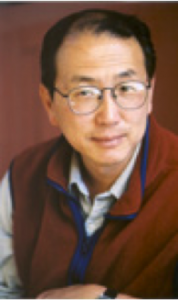
Tuesday June 3, 11:00am-12:30pm
UCR INTS 1113
A common response to an electronic book or other digital media is that, while it may be better or worse than a book, “this is not a book.” But digital media has the uncanny effect of making us realize that physical books themselves were never truly books–if by “book” we mean a long form of attention designed for the permanent, standard, and authoritative communication of human thought or experience. This talk will outline methods for discovering and tracking socially repeatable and valued “long forms of attention” whether in books or other constellations of materials, in the past or the digital present.
This talk will conclude with a look at the RoSE (Research-oriented Social Environment) created by a team at the University of California, Santa Barbara, directed by Liu.
This talk is co-sponsored by The Material Cultures of the Book Working Group
New Models of Professionalization in the Humanities with Giulia Hoffmann
May 4th, 2014
Rochelle Gold
Please join us for a talk and discussion at UC Riverside with Dr. Alan Liu of UCSB on Tuesday, June 3 from 11-12:30 pm in INTS 1113.
This is Not a Book: Long Forms of Attention in the Digital Age
A common response to an electronic book or other digital media is that, while it may be better or worse than a book, “this is not a book.” But digital media has the uncanny effect of making us realize that physical books themselves were never truly books–if by “book” we mean a long form of attention designed for the permanent, standard, and authoritative communication of human thought or experience. This talk outlines methods for discovering and tracking socially repeatable and valued “long forms of attention” whether in books or other constellations of materials, in the past or the digital present. The talk concludes with a look at the RoSE (Research-oriented Social Environment) created by a team at the University of California, Santa Barbara, directed by Liu.
“Digital Humanities & Language Resources” – Joint “Culture & Technology” and CLARIN-D European SummerSchool, 22nd of July – 01st of August 2014 http://www.culingtec.uni-
leipzig.de/ESU_C_T/
We are happy to announce that not only the Electronic Textual Cultures Lab at the University of Victoria (etcl) and the German Accademic Exchange Service (DAAD) offer generous support to participants of the Joint “Culture & Technology” and CLARIN-D European Summer School 2014 “Digital Humanities & Language Resources”, which aims at integrating Digital Humanities and Language Resources, but also the University of Leipzig , which through its International Centre now makes available bursaries for members of its Eastern European partner universities as well as for members of its non-European partner universities (please see: http://www.culingtec.uni-
leipzig.de/ESU_C_T/node/365). The Summer School is directed at 60 participants from all over Europe and beyond. The Summer School wants to bring together (doctoral) students, young scholars and academics from the Arts and Humanities, Library Sciences, Social Sciences, Engineering and Computer Sciences as equal partners to an interdisciplinary exchange of knowledge and experience in a multilingual and multicultural context and thus create the conditions for future project-based cooperations and network-building across the borders of disciplines, countries and cultures.
The Summer School aims to provide a stimulating environment for discussing, learning and advancing knowledge and skills in the methods and technologies which play a central role in Humanities Computing and determine more and more the work done in the Arts and Humanities, in libraries, archives, and museums, in the Language Industries, and similar fields. The Summer School seeks to integrate these activities into the broader context of the Digital Humanities, where questions about the consequences and implications of the application of computational methods and tools to cultural artefacts of all kinds are asked. It further aims to provide insights into the complexity of humanistic data and the challenges the Humanities present for computer science and engineering and their further development.
In all this the Summer School also aims at confronting the so-called Gender Divide, i.e. the under-representation of women in the domain of Information and Communication Technologies (ICT) in Germany and Europe. But, instead of strengthening the hard sciences as such by following the way taken by so many measures which focus on the so-called STEM disciplines and try to convince women of the attractiveness and importance of Computer Science or Engineering, the Summer School relies on the challenges that the Humanities with their complex data and their wealth of women represent for Computer Science and Engineering and the further development of the latter, on the overcoming of the boarders between hard and soft sciences and on the integration of Humanities, Computer Science and Engineering.
The Summer School takes place across 11 whole days. The intensive programme consists of workshops, public lectures, regular project presentations, a poster session and a panel discussion. The workshop programme is composed of the following thematic strands:
- XML-TEI encoding, structuring and rendering
- Query in Text Corpora
- Comparing Corpora
- Historical Text Corpora for the Humanities and Social Sciences. Digitization, Annotation, Quality Assurance and Analysis
- Open Greek and Latin
- Advanced Topics in Humanities Programming with Python
- Stylometry: Computer-Assisted Analysis of Literary Texts
- Editing in the Digital Age: Historical Texts and Documents
- Space – Time – Object: Digital methods in Archaeology
- Spoken Language
- Multimodal Corpora: How to build and how to understand them
- Large Project Planning and Management
- DH for Department Chairs and Deans
Each workshop consists of a total of 16 sessions or 32 week-hours. The number of participants in each workshop is limited to 10.
Lectures will focus among others on digital art history and underresourced languages.
Information on how to apply for a place in one or two workshops can be found at: http://www.culingtec.uni-
leipzig.de/ESU_C_T/. Preference will be given to young scholars of the Humanities who are planning, or are already involved with, a technology-based research project and who submit a qualified project description. Young scholars of Engineering and Computer Sciences are expected to describe their specialities and interests in such a way that also non-specialists can follow, and to support with good arguments what they hope to learn from the summer school.
Applications are considered on a rolling basis. The selection of participants is made by the Scientific Committee together with the experts who lead the workshops.
Participation fees are more or less the same as last year.
For all relevant information please consult the Web-Portal of the European Summer School in Digital Humanities “Culture & Technology”: http://www.culingtec.uni-
leipzig.de/ESU_C_T/ which will be continually updated and integrated with more information as soon as it becomes available. Elisabeth Burr
Prof. Dr. Elisabeth Burr
Französische / frankophone und italienische Sprachwissenschaft
Institut für Romanistik
Universität Leipzig
Beethovenstr. 15
D-04107 Leipzig
http://www.uni-leipzig.de/~burr
(via the DHSI listserv)
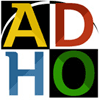 ADHO Seeks Communications Fellows
ADHO Seeks Communications Fellows
The Alliance of Digital Humanities Organizations (ADHO) seeks applicants for its Communications fellowship. Working on a small team, the fellow will write news releases, blog posts and announcements relevant to ADHO, its constituent organizations, and the broader digital humanities community; monitor and update ADHO’s social media presence; maintain its web site; help to develop and implement ADHO’s outreach strategy; and perform other communications-related responsibilities. The Communications fellow should anticipate spending approximately 3-4 hours per week on the position. The fellowship comes with a small annual stipend of 600 Euros. It is well-suited for graduate students who wish to develop deeper knowledge of digital humanities, contribute to an important digital humanities professional organization, and gain experience in social media and communications.
Desired skills and qualifications include:
- fluency in more than one language
- excellent written communication skills
- attention to detail
- good graphic design skills
- ability to work with minimal supervision
- experience creating content using Drupal or another content management system
- familiarity with social media platforms such as Twitter and Facebook
To apply, submit a CV/ resume, a brief writing sample, three references, and a cover letter describing your interest in the position, experience with social media and communications, and expertise with writing, web development, and graphic design to Lisa Spiro, chair of ADHO’scommunications committee: lisamspiro@gmail.com. The application deadline is May 16, 2014. Two positions will be available.
http://adho.org/announcements/2014/adho-seeks-communications-fellows
(via the DHSI listserv)

